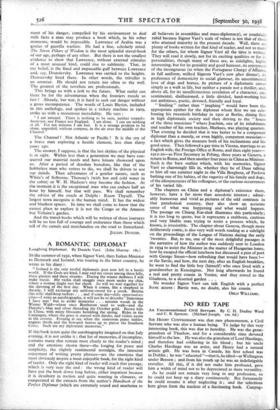A ROMANTIC DIPLOMAT
Laughing Diplomat. By Daniele Vare. (John Murray. 16s.)
IN the summer of 1932, when Signor Vare, then Italian Minister to Denmark and Iceland, was touring in the latter country, he wrote in his diary : " Iceland is the only restful diplomatic post now left in a hectic world. If the Gods are kind, I may end my career among these hills these glaciers and these streams. During the winter darkness I will make music. My violin shall snuggle once more under my chin, where a woman might rest her cheek. So will we wait together for the dawning of the first day. When it comes, like a shepherd in Arcady, I will exchange my uniform-sword for a crook. Bettina (his wife) shall keep turkeys . . . and if some day—felix opportunirate vitae—I write an autobiography, it will not be to describe ' Statesmen I have met' but to evoke memories . . . autumn woods in the Wiener Wald—where once Beethoven used to walk—and the Danube's blue and silver threading the October gold. Brown hills in China, with misty blossoms heralding the spring. Rides in the Campagna, where the grass is starred with daisies, and violets nestle in the coverts. Evening at sea, when the stateroom piano tinkles, engines throb, and the bowsprit heaves up to pierce the Southern Cross. Such are my diplomatic memories."
If this book is not quite the autobiography imagined on that July evening, it is not unlike it ; that list of memories, if incomplete, contains many that remain most clearly in the -reader's mind ; and the emotions shown there—the longing for peace and simplicity, the slightly sentimental nostalgia, the innocent enjoyment of writing pretty phrases—are the emotions that most obviously inspire a most enjoyable book, for the right kind of reader. Only the right kind of reader will reach that passage, which is very near the end : the wrong kind of reader will have put the book down long before, either impatient because it is desultory in motion and quite wanting in climaxes, or exasperated at the extracts from the -author's Handbook of the Perfect Diplomar(which are extremely sound and anathema to all believers in assemblies and mass-diplomacy), or youthfully rabid because Signor Vare's scale of values is not that of those who attained majority in the present decade. Well, there are plenty of books written for that kind of reader, and not so many for the •others, for whom Signor Vare all the time is writing. They will read it slowly, not for its exciting qualities or for personalities, though many of these are, as sidelights, highly interesting, but for its geniality and good humour, its enjoyment of the incongruous (as when the Portuguese Chargé d'Affaires, in full uniform, milked Signora Vare's cow after dinner), its preference of domesticity to social glamour, its unsentimental love of dogs and horses, its picture of a diplomatic career simply as a walk in life, but neither a parade nor a thriller, and, above all, for its unselfconscious revelation of a character, gay, sentimental, disillusioned, a little divided, hard-working but not ambitious, poetic, devoted, friendly and loyal; " Smiling " rather than " laughing " would have been the appropriate epithet for the diplomat whom first we see cele- brating his twentieth birthday in istoo at Berlin, dining first in high diplomatic society and then driving to the " house of the three musicians " where Joachim, one of its inhabitants and teacher of his own teacher, Markees, was playing quartets. That evening he decided that it was better to be a competent diplomat than a merely, or even highly, competent musician— a fact which gives the measure both of his inclinations and his good sense. Then followed a gay time in Vienna, marriage to an English wife, the Foreign Office at Rome, and then eight years- 5952-20—as First Secretary in Peking, three years at Geneva, a return to Rome, and 'then another four years in China as Minister. Such is the bare outline which, with his memories, Signor Vare so charmingly fills in, whether they be of Duse talking to him all one summer night in the Villa Borghese, of Pavlova bathing one of his babies, of the vagaries of his family and dogs, of the idiosyncrasies of his colleagues, or the curious occurrences of his varied life.
The chapters on China and a diplomat's existence there, however, have a far more than anecdotic interest ; admir- ably humorous and vivid as pictures of the odd contrasts in that paradoxical country; they also show an accurate sense of what was happening and what would happen. The passage on Chiang Kai-shek illustrates this particularly; it is too long to quote, but it represents a stubborn, cautious and very likable man trying to resist a process which, he knows, is irresistible. The chapter about Geneva, though more deliberately comic, is also very well worth reading as a sidelight on the proceedings of the League of Nations during the early 'twenties. But, to me, one of the most delightful passages is the narrative of how the author was suddenly sent to London in 1934 to assist the Minister in the matter of Hungarian loans, how he escaped the official luncheon but discussed a pint of port with George Street—how refreshing that would have been !- at the Savile, and how, the next day, after an English breakfast, he went to find the little boy (himself) who once lived with a grandmother in Kensington. Not long afterwards he found a real and pretty cousin in Venice, and they rowed to the Giudecca, to a deserted garden . . .
No wonder Signor Vare can talk English with a perfect Scots accent : Barrie was, no doubt, also his cousin.
ORLO WILLIAMS.














































 Previous page
Previous page